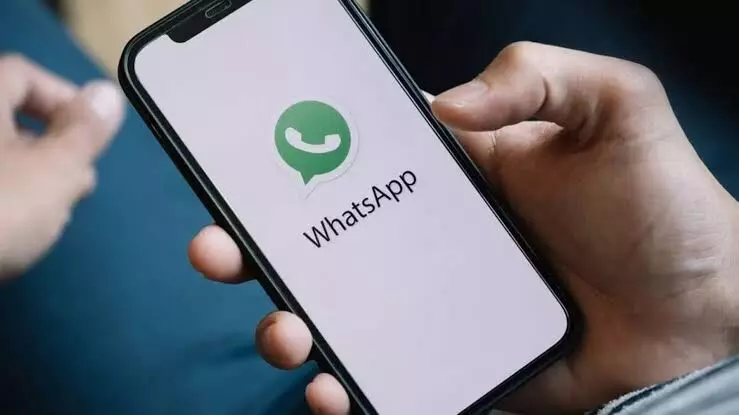Andhra Pradesh: People can soon access 100 public delivery services through WhatsApp; here is how it works
By November 31, the government will introduce the top 100 services through WhatsApp in phase I.
By Sri Lakshmi Muttevi
Representational Image.
Amaravati: People in Andhra Pradesh can now access public delivery services through WhatsApp.
Thanks to the Memorandum of Understanding (MoU) signed between Meta and the Department of Information Technology, Electronics and Communications, Andhra Pradesh government in the presence of Minister Nara Lokesh.
The MoU will enable public service delivery through the WhatsApp Business Solution. It will also push e-governance solutions making life for the common person easier.
I’m delighted to announce a landmark cooperation between the Government of AP and Meta to enable citizen-centric public services through WhatsApp. This collaboration will soon efficiently deliver public services through Meta’s innovative technology, and ensure that our… pic.twitter.com/SZurDDfP08
— Lokesh Nara (@naralokesh) October 22, 2024
From booking temple darshan tickets to scheduling temple visits or birth certificates, citizens can receive them on WhatsApp.
How does this work?
WhatsApp can be utilized as a communication and service delivery platform for the state, highlighting three primary models:
G2C (Government to Citizen)
B2C (Business to Consumer)
G2G (Government to Government)
By November 31, the government will introduce the top 100 services through WhatsApp in phase I.
How can citizens use the services?
"Citizens will not receive any text messages from the government, but they will be given a standardized number for which they can send a Whatsapp message. The government will not collect any data or register. In the backend, the options for services will be shown which the customer can select. The only authentication will be through Aadhar and OTPs. The front end will be the user and the back end will be through E-Seva, which is already an existing portal. So all government services will be provided through E-seva. The interface for the services will be Meta,” sources from the Department of Information Technology, Electronics and Communications told NewsMeter.
What are the departments are included:
1. Endowment Services: The services such as booking the slot for darshan, accommodation, Donations, and various sevas in the 7 Major temples of Andhra Pradesh
2. Revenue Services: Citizens should be able to easily check the status of their applications for various services.
Survey numbers and documents related to land parcels can be made available for transparency and ease of access. Request for caste and income certificates must be streamlined to enhance accessibility.
Assistance in locating land based on survey numbers, as users may struggle to find this information independently. Applying for the Issue of Birth and Death Certificates
3. Civil Supplies: Procurement of paddy and other commodities, issuing ration cards, and managing ration distribution.
Clear guidance on how citizens can apply for ration cards is essential and communicating the same.
4. Municipal Administration and Urban Affairs (MA&UD): Property tax payment, Birth and Death Certificates, and Trade license Registration.
5. Energy department: Payment of Electricity Bill of APEPDCL, APCPDCL and APSPDCL
Separate interaction with DisComs to understand the framework better and define robust operational protocols for Public Communication and Service delivery, For Trancos, internal communication channels, and alert services for installing new High-tension lines and power transformers based on the geo-location.
6. Meta Team: Telecos services for GIS can be integrated
7. Industries: The Industries Department is already using chatbots for outreach and communication. Efforts are underway to integrate Utility services and modalities for integrating the Single Desk Portal for entrepreneurs can be finalized. Applying for land allotment
8. Transportation: All transportation-related services for licenses and permits are currently available online, but there is potential for further enhancement to integrate all faceless services with WhatsApp to significantly streamline processes and improve user experience.
Further on Meta is working with Delhi Transport Corporation similar services can be integrated for APSRTC for ticket booking and parcel bookings.
9. School Education: Integration with WhatsApp will facilitate the dissemination of important information to parents, students, and department functionaries. A messaging system to communicate with 7 million parents regarding student attendance and performance is required with Aadhaar authentication in addition to the mobile number.
Tracking and improving curriculum outcomes can be explored. Additional courses can also be explored like Digital Nagrik.
10. Higher Education: Scheduling alerts for Entrance Tests, Admissions, Student and Staff Support Services – Virtual Teaching Assistant, LMS to improve Communication and other Soft Skills.
It also includes Pre and Pre-assessments for courses and integration of the APAAR ID for seamless access to educational services.
Campaigns for Drug and Tobacco Free campuses, Applications for applying for various certificates of various universities.
11. Skills Development & Training: Skilling and Training programs ensuring compliance with Government of India standards, Aid in conducting a Skill Census to gather data on skill development needs.
12. ITE&C and RTG: Ensuring Data Security protocols is key. WhatsApp is only an additional communication channel and all data is with the government as per the requirement APIs are to be whitelisted for integration.
13. GSWS Department: 350+ services across 29 departments have been integrated under the GSWS department for effective service delivery. Other dynamic services of the departments can be explored parallelly.
What are the emergency services which can be used?
1. Emergency Alerts: WhatsApp can facilitate real-time notifications with a capacity of 10 lakh alerts per hour.
2. Tourism: Disseminating essential updates and travel information.
3. Grievance Redressal: A streamlined platform for citizens to raise concerns.
4. Infrastructure Updates: Regular updates on projects, road conditions, and more.
5. Agriculture: Information delivery on market prices, weather, and best practices.
6. Taxation: Simplifying communication on tax-related information, deadlines, and procedures.
7. Interactive Models: Custom bots and automated workflows tailored to government needs streamlining processes, and enhancing service delivery.